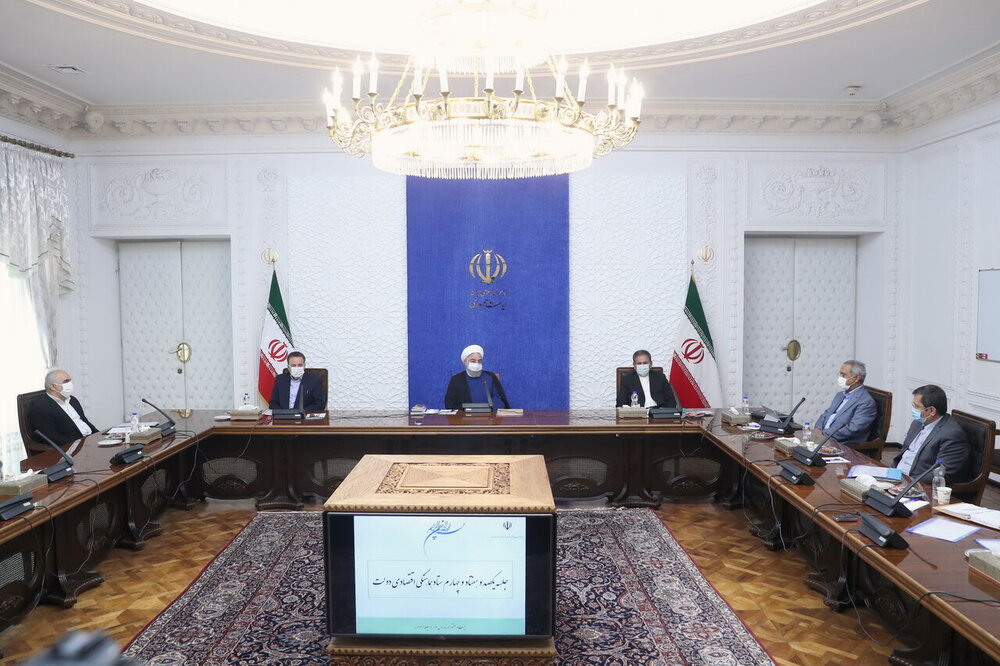Rouhani: Enemies have invested in domestic disputes

TEHRAN – President Hassan Rouhani says that his administration has thwarted U.S. ominous goal to bring about the collapse of national economy through sanctions.
“Although the inhumane, illegal U.S. sanctions have reduced the country’s revenues and the country’s revenues in the year 1399 (2019-2020) are not comparable to the revenues in early 1390s (2010s), but after 2.5 years of sanctions, the government has thwarted the U.S.’s ominous plot to bring about the country’s collapse,” Rouhani said at a meeting of the government's economic coordination headquarters in Tehran on Sunday.
The president also said Iran’s enemies have invested in the country’s domestic disputes as a supplement to their economic pressure and sanctions.
“I invite all authorities, active figures, and those who are concerned about the establishment and the country to maintain serenity and political wisdom to prevent disagreements and disputes,” Rouhani suggested.
The United States, under Donald Trump, has put enormous economic pressure on Iran through sanctions which have mainly targeted Iran’s oil industry and its banking system. The sanctions also have hampered the government’s efforts to contain the coronavirus outbreak.
The sanctions were put in place under the Trump administration’s “maximum pressure” campaign, which he pursued after he unilaterally withdrew the U.S. from the 2015 Iran nuclear deal.
The latest round of Trump administration’s sanctions were announced last week. They targeted Iran’s financial sector in defiance of Washington’s European allies who warned of the humanitarian consequences of the sanctions on Iran’s fight against the coronavirus.
The new sanctions target the few remaining Iranian banks which were not subject to secondary sanctions.
In a tweet, U.S. State Secretary Mike Pompeo announced that the United States is sanctioning 18 major Iranian banks and identifying Iran’s financial sector.
Independent analysts warn that U.S. sanctions are an “act of war” because they cause a shortage of the essentials of life.
“Let me say that the U.S. sanctions on Iran are an act of war. The impact on Iran is as if America was fighting a war but without bombs and bullets. Iran’s economy is being destroyed. There are shortages. Iranians lack some of the essentials of life. Patients are dying in hospitals because of a shortage of supplies. These are the fallouts of war,” Hossein Askari, a professor of International Business at the George Washington University, told the Tehran Times after new financial sanctions.
Last month, Foreign Minister Mohammad Javad Zarif accused the United States of impeding Iran’s ability to fight the outbreak, saying that U.S. sanctions have prevented the purchase of critical medical supplies.
In an interview with Russia Today published, Zarif said Washington’s efforts to stop Tehran from exporting oil have limited the government’s ability to respond to the global health crisis and provide relief to the Iranian people.
Iran also has “quite a bit of money stashed in countries abroad,” he said, adding that the U.S. has prevented Tehran from gaining access to these funds, even to buy medicine.
Since May 8, 2018, when Trump withdrew the U.S. from the nuclear deal, his administration has made efforts to impose “the strongest sanctions in history” against Iran in an effort to make it choose between agreeing to U.S. demands or facing economic collapse.
Nearly two weeks after Trump pulled out of the JCPOA, U.S. Secretary of State Mike Pompeo showed up at the Heritage Foundation outlining U.S. demands of Iran and threatening to inflict economic pain on Iran.
These (sanctions) will indeed end up being the strongest sanctions in history,” Pompeo said at the time.
MH/PA

Leave a Comment